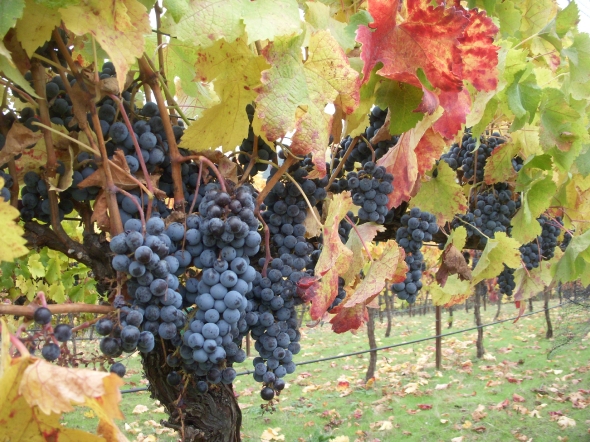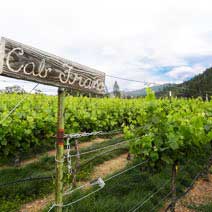New Land Use Law Affects Rogue Valley Wineries and Farmers
Usually I write about wine and how to get the most pleasure from it. This month, with the World of Wine Festival in the limelight, the Review’s publisher asked if I’d do an editorial piece on the impact on wineries from a new land use law passed by our Oregon Legislature late in June. So here it goes.
 To begin, why did we need a new law? That one is simple. First, the old law regarding wineries was set to expire soon and the wineries needed some idea of what business practices they would be allowed to start or continue. Second, the law was intended to insure that our agricultural lands would be used for farming and not consumed by buildings and nuisance-creating businesses that destroyed the rural nature of the surrounding communities. Third, it was supposed to create some consistency across the state, removing county-by-county discretion over winery location and allowable business practices.
To begin, why did we need a new law? That one is simple. First, the old law regarding wineries was set to expire soon and the wineries needed some idea of what business practices they would be allowed to start or continue. Second, the law was intended to insure that our agricultural lands would be used for farming and not consumed by buildings and nuisance-creating businesses that destroyed the rural nature of the surrounding communities. Third, it was supposed to create some consistency across the state, removing county-by-county discretion over winery location and allowable business practices.
With Oregon’s legislature taking up the question, the Oregon Winegrowers Association took on the task of trying to insure that an industry-friendly law replaced the soon-to-expire one. Many of those working on that task are friends of mine so I know they were sincere in those efforts. Did they succeed? To answer the question, we must consider, “will it further statewide economic gains from the wine industry and will it benefit grape growers?”
I see problems, especially in view of how the wine business operates here in Southern Oregon. My great concern is the law’s detrimental impact that falls on the smallest wineries, where the new law is oddly even more restrictive than the one it replaces. Many current local wineries could not have opened their doors had this new law been in effect when they started. In short, the legislature, I hope unintentionally, made it more difficult for a new winery to start up.
There are other problems with the new legislation, but space is limited so let me concentrate on explaining just this one aspect of the new law – the adverse impact that comes from the unfortunate restriction on small wineries.
 Under past legislation, a winery could start by growing their grapes themselves or by engaging in long-term contracts to purchase grapes. That meant rather than planting an entire vineyard ahead of starting winery operations they could instead channel the nearly $250,000 it takes to create the now-mandated vineyard into establishing the winery – and bring the vineyard along later. A business model that is now disallowed.
Under past legislation, a winery could start by growing their grapes themselves or by engaging in long-term contracts to purchase grapes. That meant rather than planting an entire vineyard ahead of starting winery operations they could instead channel the nearly $250,000 it takes to create the now-mandated vineyard into establishing the winery – and bring the vineyard along later. A business model that is now disallowed.
But there’s another shoe to drop. There’s an impact on small artisan grape growers who intended to plant and sell grapes to what might have been numerous emerging small wineries – wineries that won’t be able to begin winery operations under the new law. Here in the Rogue Valley, these artisan wine-grape growers average about 2.5 acres in size and sell their grapes to supplement otherwise rather meager incomes. Without the small winery market, these family farming operations won’t be able to obtain an income from farming their family lands. The lands go fallow and our county loses even more productive farmland.
So if you believe, as I do, AND as recent economic studies from around the country have shown, that 1) Oregon’s beneficial economic impact from our wine industry, now figured at around $2.7 billion, increases based on the health and quantity of small wineries. 2) That grape prices increase based on the number of small wineries and not the number of large wineries whose purchasing power allows them to dictate lower grape prices. 3) That it’s the diversity and intrigue of the small winery that tourists visiting our wine country want to experience, then the new land use legislation’s unfavorable treatment of small wineries will indeed inhibit the overall growth of Oregon’s wine and wine-tourism business affecting restaurants, hotels, and merchants of all types.
Well sure you say, making an omelet means breaking some eggs, so if the legislature wants to express the will of the people to preserve our best Ag lands for growing things, they have to keep small wineries from springing-up and erecting buildings that push crops off Oregon’s farm lands.
I might even support that argument were it not for the fact that the new legislation outright allows churches, private parks and playgrounds (can anyone say motorcycle park), non-profit corporate offices, asphalt plants, fireworks manufacturers and numerous other – dare we call them non-farm land uses – right alongside these restricted wineries. Growing nothing and clearly altering the traffic, noise levels and rural feel of the area – a testament to the power the influential can have on our legislature.
So, while I applaud the sincere work that some in our industry put into getting even this more restrictive new law passed, I sincerely hope the legislature will amend it in the next session to give small wineries their just recognition and remove detrimental restrictions that inhibit small winery establishment and operations.
We small wineries don’t enjoy the same influence in our legislature as some others might, but oddly, we are the dominant drivers of our industry’s economic prosperity – something apparently overlooked in the rush to pass the new legislation that favors the politically influential while it restricts the businesses and opportunities of the little folks.
Duane Bowman is a Director of Applegate Valley Oregon Vintners Association and winemaker at Cricket Hill Winery located at the 2 mile marker on Little Applegate Rd. Find him at www.crickethillwinery.com or email duane@crickethillwinery.com

